- News
- Reviews
- Bikes
- Accessories
- Accessories - misc
- Computer mounts
- Bags
- Bar ends
- Bike bags & cases
- Bottle cages
- Bottles
- Cameras
- Car racks
- Child seats
- Computers
- Glasses
- GPS units
- Helmets
- Lights - front
- Lights - rear
- Lights - sets
- Locks
- Mirrors
- Mudguards
- Racks
- Pumps & CO2 inflators
- Puncture kits
- Reflectives
- Smart watches
- Stands and racks
- Trailers
- Clothing
- Components
- Bar tape & grips
- Bottom brackets
- Brake & gear cables
- Brake & STI levers
- Brake pads & spares
- Brakes
- Cassettes & freewheels
- Chains
- Chainsets & chainrings
- Derailleurs - front
- Derailleurs - rear
- Forks
- Gear levers & shifters
- Groupsets
- Handlebars & extensions
- Headsets
- Hubs
- Inner tubes
- Pedals
- Quick releases & skewers
- Saddles
- Seatposts
- Stems
- Wheels
- Tyres
- Health, fitness and nutrition
- Tools and workshop
- Miscellaneous
- Tubeless valves
- Buyers Guides
- Features
- Forum
- Recommends
- Podcast
review
 Merida Speeder T3 - riding
Merida Speeder T3 - riding£629.00
VERDICT:
Comfortable, versatile and well set up for the daily grind
Weight:
10,240g
Contact:
www.merida.com
At road.cc every product is thoroughly tested for as long as it takes to get a proper insight into how well it works. Our reviewers are experienced cyclists that we trust to be objective. While we strive to ensure that opinions expressed are backed up by facts, reviews are by their nature an informed opinion, not a definitive verdict. We don't intentionally try to break anything (except locks) but we do try to look for weak points in any design. The overall score is not just an average of the other scores: it reflects both a product's function and value – with value determined by how a product compares with items of similar spec, quality, and price.
What the road.cc scores meanGood scores are more common than bad, because fortunately good products are more common than bad.
- Exceptional
- Excellent
- Very Good
- Good
- Quite good
- Average
- Not so good
- Poor
- Bad
- Appalling
The Speeder is an important bike for Merida in the UK. The £600-£650 price point is a really crucial one for manufacturers these days, as it's the kind of money lots of people are spending on bikes through company-run cycle-to-work schemes. In fact, we happen to know that one of the Merida's direct competitors, the Specialized Sirrus Comp, is Cyclescheme's most-supplied bike of all time. It's important for Merida to get this bike right, then. So have they?
What's it like to ride?
Our bike was a 55.5cm, which turns out to be a large, plenty big enough for me (1.90m) - the bike's geometry is more MTB than road bike. The stem is quite long (125mm) which gives the bike a bit more reach than you might expect, and generally the cockpit position is good for town riding, though even with the long stem it's a bit upright on longer rides.
Out of the box it's a very comfortable bike to pilot, mostly down to the reasonably soft saddle and the big air chambers of the Kenda 32mm tyres. It doesn't feel too quick when you first set off though, and much of that is down to the tyres as well. If your commute takes you onto unsurfaced paths or cobbles then you might feel the benefit, but for me they're the one component I'd swap out straight away, as they're much too big and heavy. I replaced them with a slightly racier set of Kevlar-beaded 26mm tyres and the performance of the Speeder was noticeably improved.

The wheels themselves aren't particularly heavy, and the bike's overall weight at 10.2kg is pretty reasonable too, so with light rubber the bike's quite happy to spin along and in fact it's a nice place to sit on even fairly lengthy rides. The biggest I managed during testing was 45 miles, which is a bit more than the bike's designed for, but it's very capable of that and more. The 52-42-30 triple and 11-25 cassette give you all the gears you're ever likely to need short of a 25% lakeland pass, and shifting is positive and accurate.
Handling is generally good, though the long stem means you're a bit more forward weight-wise, making the back end a bit more skid-happy than other urban machines I've ridden. That's what I've put it down to, anyway; it may just be the combination of good brakes and not-so-good tyres! Steering is precise but not especially quick, making it a very stable descender but not quite as happy as some urban machines when you're flicking through traffic.

You've got the option to fit full mudguards and a rack, and specced as sold (actually, add some bar ends) it would be a good light tourer - those big tyres would come into their own then. It's a pretty versatile machine all told, we even took it round a bit of the Ashton Court singletrack on the demo day without any thrills or spills. Stick some 'cross tyres on and you could easily hit the rough stuff, the handling is nice and predictable and there's plenty of standover room.
What do you get for your money?
First impressions of what you're getting for your money are good. The Aluminium frame and carbon-blade fork are nicely constructed and finished, and hanging off them are some good quality components for the money. The FSA Gossamer chainset runs on external BB bearings, and drives an Ultegra rear mech. The gear cables run under the BB, and the rear brake cable runs internally along the top tube, giving an uncluttered look.
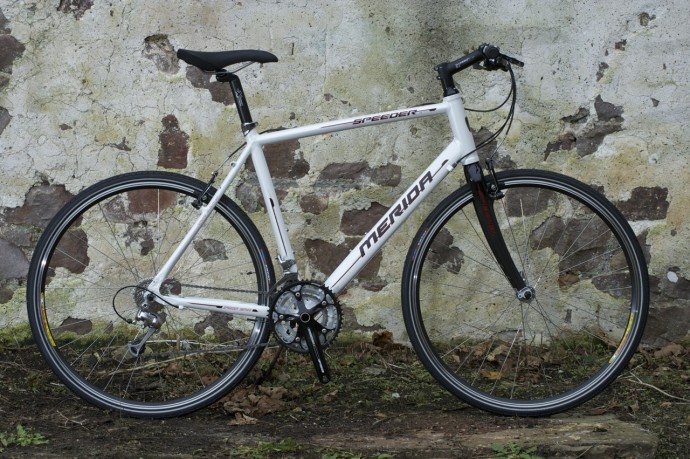
You get good quality wheels – Tiagra hubs laced to Mavic CXP22s – and good stopping too with Avid's FR5 levers and SD3 brakes. Other than Shimano's R440 9-speed shifters it's mostly Merida's own kit other than that, which is solid if a little uninspiring. The lockring grips are good though.
Summary
So if you've got £650 to blow on an urban bike, is this your best bet? Well, compared to the obvious rival, the Sirrus Comp, it's not as developed in terms of the frame design. You get carbon chainstays and elastomer inserts with the Specialized, but equipment-wise the Merida is very well specced with better transmission and wheels; the Sirrus still has a square taper BB – remember them? Given that it's a workhorse bike that you're not really likely to upgrade much, you have to look at the whole package, and the Speeder certainly gives the Sirrus a run for its money. It's not super quick – the Speeder name is a bit of a misnomer, really – but it is comfortable, versatile and well set up for the daily grind.
Dave is a founding father of road.cc, having previously worked on Cycling Plus and What Mountain Bike magazines back in the day. He also writes about e-bikes for our sister publication ebiketips. He's won three mountain bike bog snorkelling World Championships, and races at the back of the third cats.
Latest Comments
- Backladder 1 hour 7 min ago
So it is only universal to the frames that are designed to work with it?
- E6toSE3 1 hour 9 min ago
Are you a spokesperson for illegal bike importers and drug dealers who use them? Two wheels is not necessarily good and can be very bad indeed
- brooksby 1 hour 8 min ago
Most of that area is "cut off" or practically stationary every Saturday and Sunday (and most other days) during June and July. But the "carnage"...
- Oldfatgit 1 hour 30 min ago
A positive cycling story on the BBC? Did it get broadcast nationwide or just stay on BBC Alba?
- wtjs 1 hour 46 min ago
I remain mystified by the modern devotion to multiple expensive bags, each with a tiny capacity and laboriously fixed to the bike with numerous...
- mdavidford 3 hours 33 min ago
What a waste! - spending all that money on infrastructure on ships, when they don't even pay their bridge tax. And besides - no-one will use it -...
- Andrewbanshee 3 hours 35 min ago
I read the headline as Will Self. Blimey didn't expect him being on here, and getting all hot too.
- wtjs 3 hours 40 min ago
We (society) would probably get a lot more value out of using the sensors, computers, and controllers that were intended to enable self-driving...
- pawhit 3 hours 42 min ago
I have K-Edge XL mounts on my two road bikes and my gravel bike. They're nicely made although the color has faded on my red mount, I guess due to...
- NickSprink 4 hours 3 min ago
I second the Tufo Thunderos, great for summer gravel and all road riding (used them last winter on road rides due to the rain)....
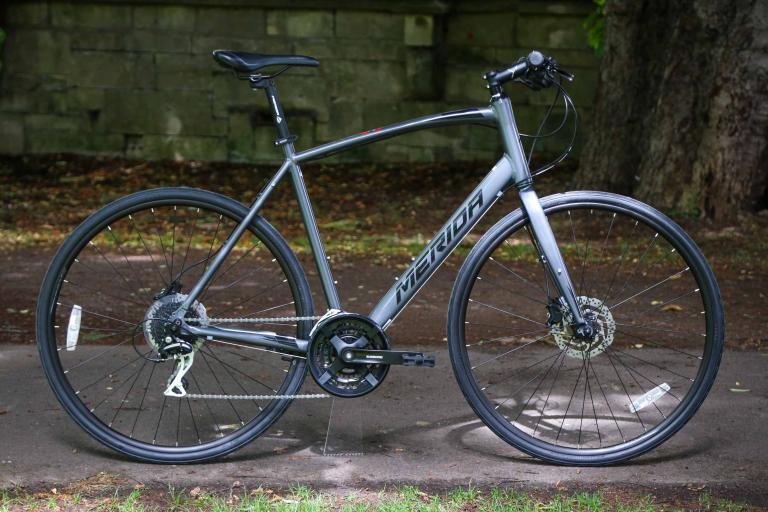
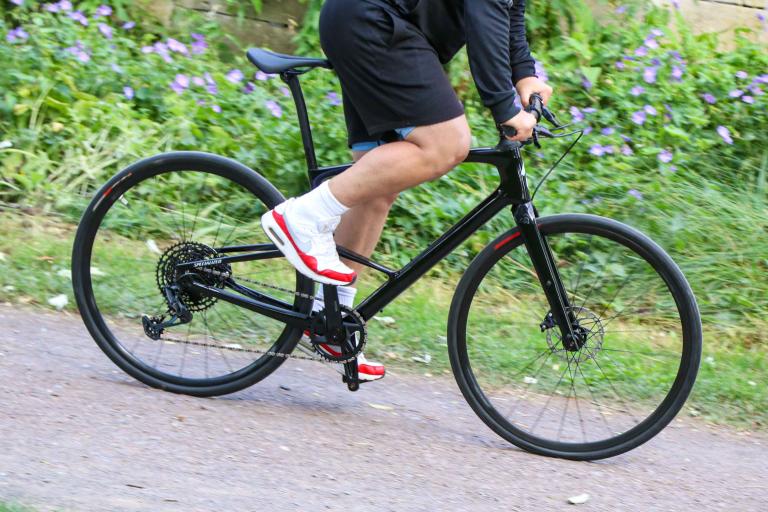
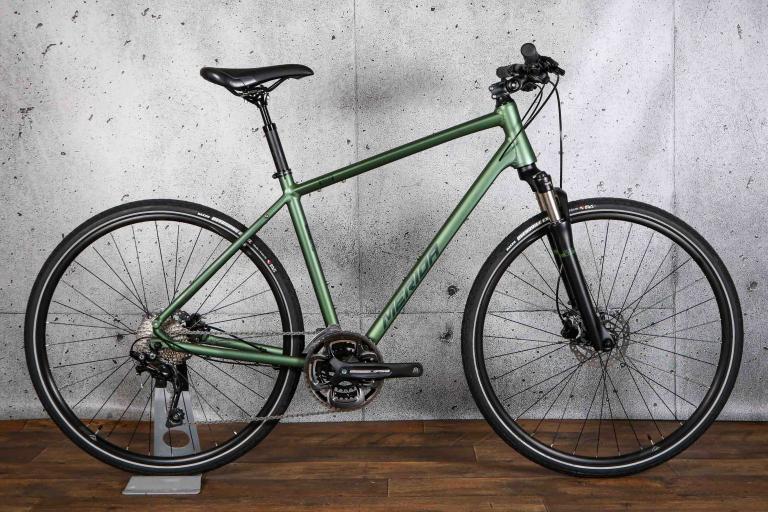
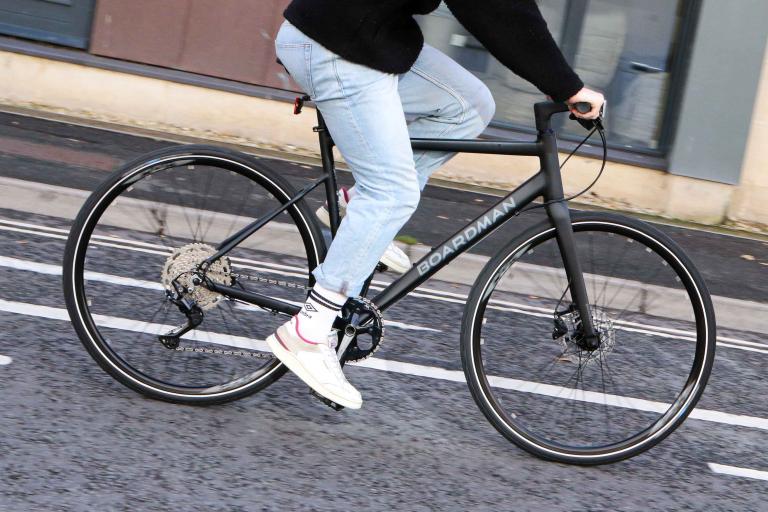
Add new comment
1 comments
I bought the S Presso 500 in preference to the Speeder, mainly for the disc brakes. I also fitted a rack and mudguards plus a shorter steering stem.
I find it a pleasing ride around my local country lanes, towpaths and around town.